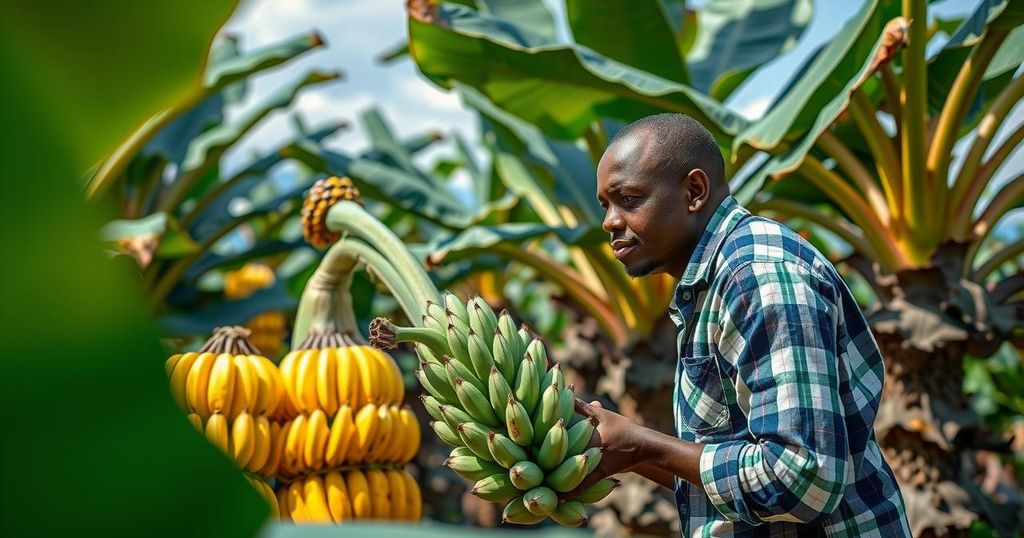A novel insurance scheme is being introduced in Uganda to protect banana farmers from the adverse effects of climate change. This initiative, supported by UNEP and the Banana Industrial Research and Development Centre, utilizes technology to streamline insurance processes, providing farmers with much-needed financial security against extreme weather events. With plans for expansion, this program aims to enhance the resilience of 50,000 banana farmers while aligning with global climate goals.
In Uganda, banana farmers like Ahumwire Justine are facing growing threats to their livelihoods due to extreme weather events exacerbated by climate change. Last October, a severe storm decimated a significant portion of Justine’s plantation, damaging 300 banana trees and killing livestock, which left her family contemplating abandoning their agricultural pursuits. This event underscores the increasing unpredictability of Uganda’s weather, where farmers have reported erratic growing seasons marked by both droughts and heavy rainfalls. To combat such vulnerabilities, the NDC Action Project, a collaboration between the United Nations Environment Programme (UNEP) and UNEP Copenhagen Climate Centre, is introducing a novel insurance scheme aimed at providing farmers with a buffer against climate-related losses. Mirey Atallah, Chief of the Adaptation and Resilience Branch at UNEP, remarked, “We know farmers, particularly smallholders, are struggling to adapt to the effects of the climate crisis… They increase resilience and ensure that extreme weather does not have to be catastrophic for farmers.” With bananas being a staple in Uganda’s agriculture—engaging 47 percent of farmers in cultivation—the reliability of this crop is crucial for many households. Despite the inherent risks presented by climate change, including potential economic upheaval, initiatives like this insurance scheme are helping mitigate risks associated with crop production. The Banana Industrial Research and Development Centre, representing a network of 5,000 banana farmers, has been pivotal in helping farmers engage with the digital platform that facilitates crop insurance. Farmers have been trained to use smartphones to document crop health and report damage during adverse weather events. As the reporting system is primarily digital, it streamlines insurance claims, thereby encouraging prompt payouts and making loans more accessible. Nearly 50 percent of those trained are women, showcasing a commitment to inclusivity within these initiatives. Given the success of this pilot program, plans are underway to expand coverage to 50,000 banana farmers nationwide. For farmers like Justine, the introduction of insurance provides reassurance and security. “I know that if [my crops get damaged] I have help. It is not like in other years, where I would have to start from zero,” she expressed. Beyond supporting farmers, these efforts align with UNEP’s overarching goals under the Paris Agreement, aimed at keeping global temperature increases well below 2°C. This initiative highlights the critical relationship between sustainable agriculture practices and combating climate change, particularly in vulnerable regions such as Uganda.
The agricultural landscape in Uganda is significantly shaped by the cultivation of bananas, an essential crop not only for food security but also for the economy, as a considerable percentage of the farming population relies on banana production. However, the impacts of climate change have created a precarious situation for these farmers, leading to unpredictable weather patterns that threaten crop yields and farmer livelihoods. In response to these challenges, innovative solutions are being explored, such as insurance schemes that leverage technology to provide financial protection for farmers against climate-induced damages. These efforts are part of broader initiatives aimed at enhancing resilience within the agricultural sector and addressing the larger implications of climate change.
In summary, Uganda’s banana farmers are increasingly vulnerable to the adverse effects of climate change, underscoring the need for robust adaptive strategies. The introduction of a novel insurance scheme through initiatives like the NDC Action Project is a significant step towards providing these farmers with the necessary support to navigate extreme weather events. By integrating technology, education, and financial resources, this program not only aims to protect farmers’ livelihoods but also contributes to the broader goals of climate stability in line with international agreements.
Original Source: www.unep.org







